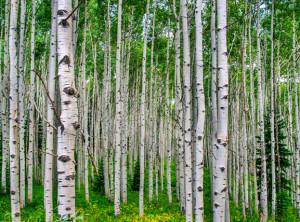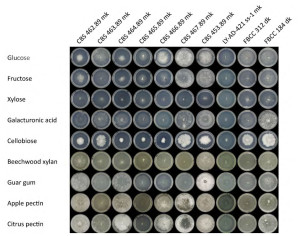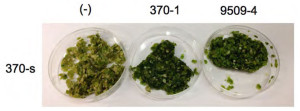Combining complementary resources for greater scientific understanding.

The interaction between aspens, ectomycorrhizal fungi and plant growth promoting bacteria is the focus of a selected proposal from Jonathan Cumming of West Virginia University. (Image by Roy Kaltschmidt, LBNL)
The U.S. Department of Energy Joint Genome Institute (DOE JGI) and the Environmental Molecular Sciences Laboratory (EMSL) have accepted 12 projects submitted during the 2014 call for Collaborative Science Initiative proposals.
The collaborative call represents a unique opportunity for researchers to combine the power of genomics and molecular characterization in one research project to help advance the missions of the Department of Energy’s Office of Biological and Environmental Research (BER). The selected researchers will have access to the capabilities of both user facilities. They will also be able to generate datasets unique to these two facilities – beyond what could be generated by either facility by itself.
“These approved projects represent an excellent cross-section of research in biogeochemistry, carbon cycling and biofuel/bioproduct production,” said Scott Baker, EMSL’s Science Theme Lead for the Biosystem Dynamics and Design. “It’s very exciting to continue our collaboration with JGI and I look forward to the insights and impact these projects will produce.”

Growth profile of a selection of tested isolates of the white rot fungus D. squalens. (Image courtesy of Ronald de Vries, CBS-KNAW Fungal Biodiversity Centre)
The accepted proposals will begin on October 1, 2014 and include:
- Coupling microbial communities to carbon and contaminant biogeochemistry in the groundwater-surface water interaction zone. PI-James Stegen, Pacific Northwest National Laboratory
- Decoding DOM degradation: How does carbon source and sunlight exposure alter microbial metabolism and expression of genome-encoded metabolic degradation of permafrost organic matter? PI-Byron Crump, Oregon State University
- Dissecting intraspecies diversity in fungal wood decay. PI-Ronald de Vries, CBS-KNAW Fungal Biodiversity Centre
- Elucidating the influences of engineered N-glycosylation motifs in bacterial biomass hydrolyzing enzymes upon heterologous and native gene expression, secretion and degradation in Aspergillus niger. PI-Jon Magnuson, Pacific Northwest National Laboratory
- Integrated biogeochemical modeling of microbial consortia mediating anaerobic oxidation of methane in dynamic methane hydrate-bearing sediments. PI-Frederick Colwell, Oregon State University
- Integrated genomic/transcriptomic/secretomic study of plant-fungal interactions between pines and their symbiotic ectomycorrhizal fungi in the mushroom genus Suillus. PI-Rytas Vilgalys, Duke University
- Mapping the metabolism of nutrient and carbon exchange in the plant-microbe symbiosis. PI-Jonathan Cumming, West Virginia University
- Microbial controls on biogeochemical cycling in deep subsurface shale carbon reservoirs. PI-Kelly Wrighton, Ohio State University
- Quantifying differential expression and identifying bottlenecks in methanogenic pathways. PI-Zaida Luthey-Schulten, University of Illinois at Urbana-Champaign
- Sensing external metals by outer membrane beta-barrel proteins. PI-Thomas DiChristina, Georgia Institute of Technology
- Systems-level insights into carbon transformations in thawing permafrost by parallel high-resolution organic matter and microbial community characterizations. PI-Virginia Rich, University of Arizona
- Uncovering the composition and function of the aquatic microbiome for duckweeds. PI-Sarah Lebeis, University of Tennessee

Effects of bacteria co-cultivation on health of duckweed (Lemna minor) strains. Improved health of the duckweed fronds, as indicated by higher chlorophyll content, can be discerned in the bacteria treated (370-1 and 9509-4) samples as compared to the mock control (-). (Image courtesy of Sarah Lebeis, University of Tennessee)
Researchers submitted a total of 31 proposals during the call. The 12 approved projects will kick off in fiscal year 2015 and run for up to 18 months. These projects fall within the second collaborative call by EMSL and the DOE JGI since the first in winter 2013.
BER, which is within DOE’s Office of Science, stewards both EMSL and the DOE JGI, and both user facilities play critical roles in supporting DOE’s energy, environment and basic research missions.